78 Search Results for object symbols
December 17, 2012
by Robin Parker -
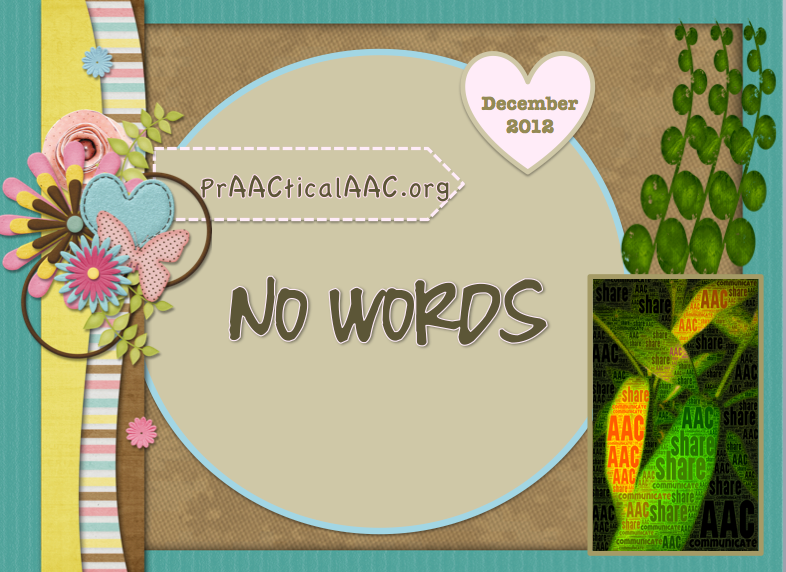
It’s been a long few days. Like everyone else, the Sandy Hook Elementary School Massacre has been on our minds, in our hearts, and in our dreams. We didn’t want to write about it. We didn’t even want to think about it. We have refrained from tweeting and ‘Facebooking’ about it. It’s all just too hard. Too sad. Too overwhelming. Too… Well, you know. But as the numbness started to wear off, we realized that we couldn’t avoid blogging about it. Why? Because it matters to people with AAC needs, too. And we, of all people, should understand that silence is not the answer. Unfortunately, we have been through other horrific world events and people who use AAC or communicate in other unconventional way have told us. “We’re hurting, too.” The SLP community has something to offer here and a responsibility to help where we can. As clinicians, we agonize. “What... [Read More...]
November 24, 2012
by Robin Parker -
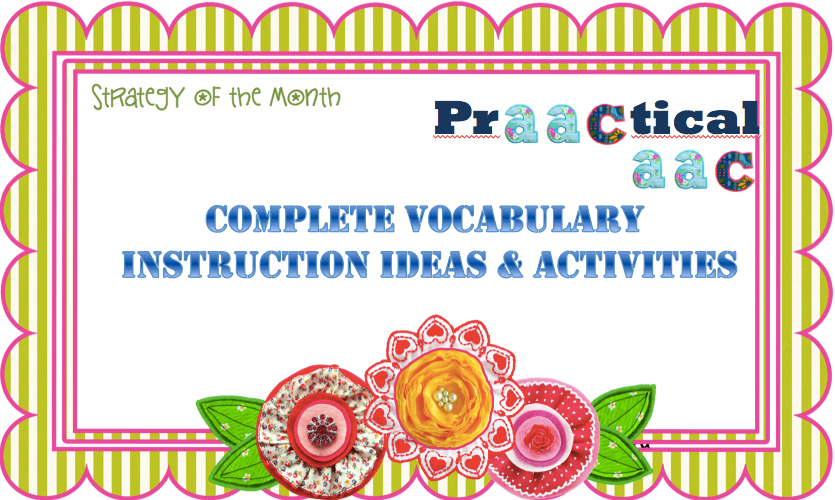
We love incorporating new vocabulary into fun motivating activities even when we are doing direct vocabulary instruction. We embed new vocabulary in activities using all of the language modalities- reading, writing, talking, and listening. We use planned vocabulary instruction activities as well as unexpected opportunities to embed new vocabulary. We like to stay within the theme of vocabulary learning but try and stay flexible in case a perfect opportunity arises that allows us to reflect back on an old vocabulary theme or mention a future planned theme. The main goal of direct vocabulary instruction is more than learning a new list of words, it is learning robust word knowledge so that language skills can be broadened. Consider these vocabulary instruction steps by Robert Marzano. These steps were not specifically developed for AAC users but if we add a language focus and a little more fun and active participation, they... [Read More...]
November 10, 2012
by Robin Parker -
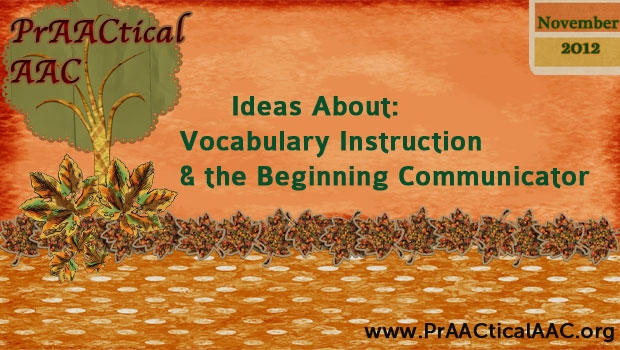
Vocabulary instruction is a topic not often discussed for beginning communicators. As we work with beginning communicators the primary focus is often vocabulary selection for communication displays. This is understandable as the beginning communicator has many needs, but that is no excuse for leaving out vocabulary instruction. Direct vocabulary instruction helps expand broader vocabulary selection options, literacy skills, and world knowledge. With that in mind, see below for vocabulary instruction philosophies, notes, and activities for the beginning communicator. Please let us know about your favorite vocabulary instruction activities. Vocabulary Instruction for the Beginning Communicator: 5 Philosophies Vocabulary instruction involves a systematic TEACHING process. Add vocabulary as an activity on the daily schedule and then have a mini-schedule for the specific vocabulary instruction activities for that day. Carole introduced general steps for vocabulary instruction last week. For the beginning communicator, also apply an errorless learning paradigm. Gradually, add comprehension checks, but... [Read More...]
October 9, 2012
by Carole Zangari -
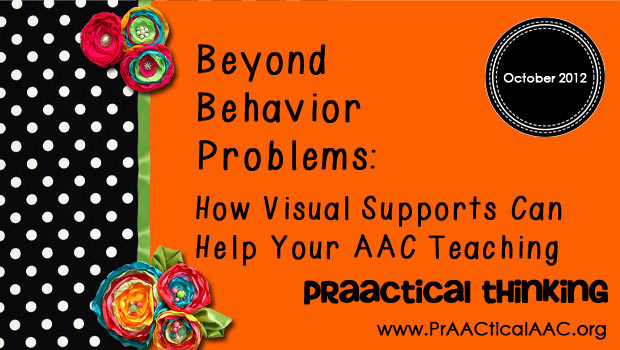
Visual supports are not just for people with behavioral challenges. In this post, we share some ideas of using visual schedules and other supports to enhance comprehension and language learning. Let’s look put this into a clinical context. Marvin is a high school student with intellectual disabilities and cerebral palsy who is learning to use a high tech SGD. He is a personable young man who engages easily and comes to each session with a ‘ready to learn’ mindset. Most of Marvin’s goals revolve on learning to build sentences using core words. Although he has very limited literacy skills, he really, really wants to learn word prediction. This presented a bit of a dilemma, as I typically don’t begin to teach word prediction until spelling skills are approaching the third grade level. Marvin has some terrific splinter skills but his overall spelling skills are probably around the mid-first grade level.... [Read More...]
September 2, 2012
by Robin Parker -
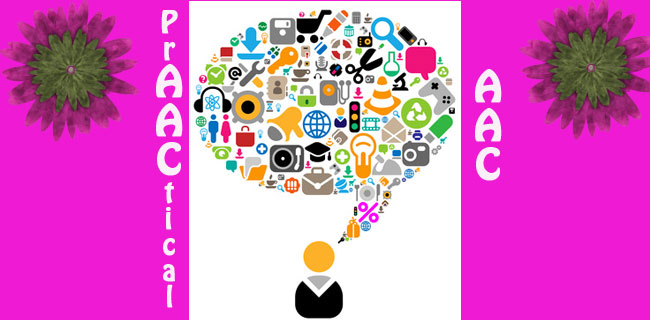
We have recently been surprised (ok, shocked) by the absence of communication supports in educational settings that are supposed to be supporting learners with significant communication challenges. To be even more specific and blunt, the students do not have functional spoken speech. They can’t speak to let you know: what they need, what they don’t need or want, how they feel, what they see, what interests them, what questions they have, what they like and don’t like, when they really reallywant something, etc., etc. etc. And, trust us, they do need to say all of these things. If you work with anyone who does not use spoken speech and we mean ANYONE, they deserve the basic right to communicate with you. Our PrAACtical AAC Absolute A’s: AAC displays need to be accessible ALLOVER. There is no special ‘communication time.’ Communication teaching is ALL the time in authentic situations.... [Read More...]
April 11, 2012
by Carole Zangari -
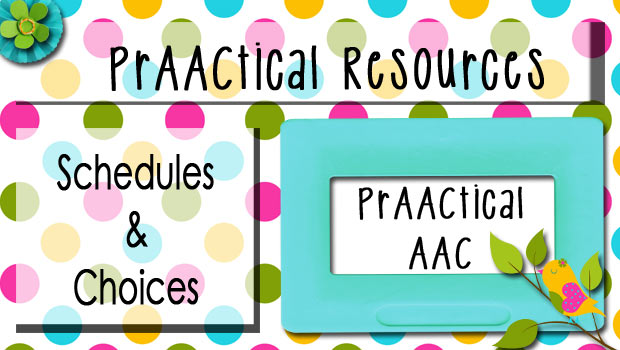
– If you follow our blog, you know that last month we had lots to say on making, teaching, and using Visual Schedules. We ran out of time before we could discuss a question that comes up a lot in our own clinical practice. What role does choice-making play in visual schedules? Here are some of the things we think about when we consider this for the schedules we make and use. We all like to have some say in what we do. Giving the learner an opportunity to make choices in a schedule makes sense when personal autonomy is a priority. Allowing the learner to choose which activities to place on the schedule supports personal autonomy: Having control over what happens in our lives is a big part of happiness for most people. – Here’s how we might do that with a visual schedule for a therapy session. 1.Select... [Read More...]
March 31, 2012
by Carole Zangari -
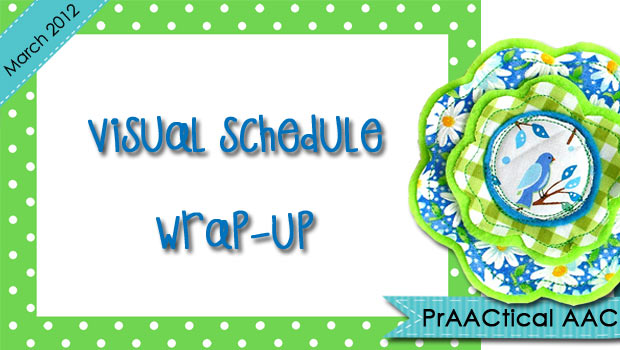
In this last post on our March Strategy of the Month, visual schedules, we address a couple of questions about using schedules and end with a list of helpful resources. Lots to click on and explore! – What about activities that don’t happen very often? How do we incorporate those into the schedule? Many of the learners with whom we work get quite stressed when the typical routine is violated. It could be an undesired change, like a fire drill or a dentist appointment. Or it could be that a regular event gets cancelled, such as when our music therapist is out sick or when outdoor recess is cancelled due to bad weather. Even changes that involve the addition of a positive event, such as a birthday party or a special classroom guest, could lead to stress and meltdown. If we have advance notice of the change, we can use... [Read More...]
February 15, 2012
by Carole Zangari -
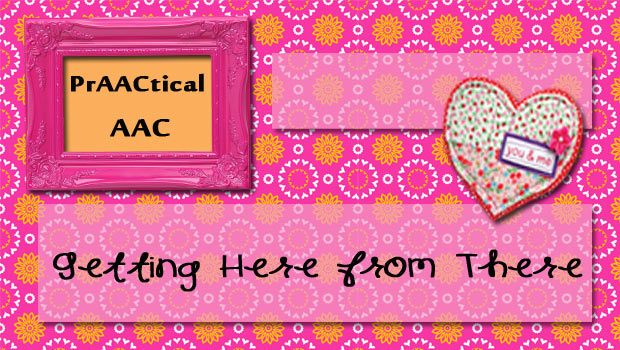
We wanted to take a breather from all the busyness to reflect on the year and to offer up some words of appreciation. For us, 2011 started with our version of a retreat: a long walk in the sun, a half day of venting our frustrations and a half day of planning new projects interspersed with lunch at the beach. (There might have been a bottle of wine in there somewhere, too.) We’d both been feeling more than a bit discouraged that the quality of AAC services is still so spotty. There are some fantastic SLPs and teachers, of course, but not enough to go around. The ‘good ones’ are too busy. And the not-so-good ones were doing too much damage. It seemed to us that too many folks with significant communication challenges weren’t getting what they needed and that stressed us out to no end. Just when we had calmed down, we... [Read More...]







